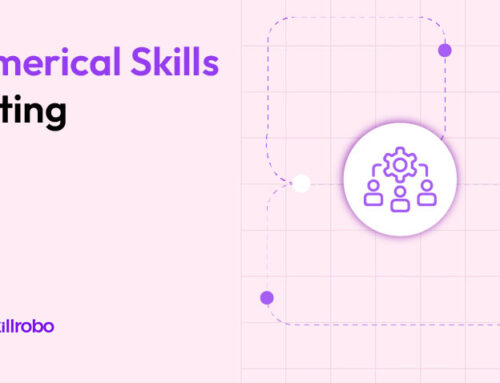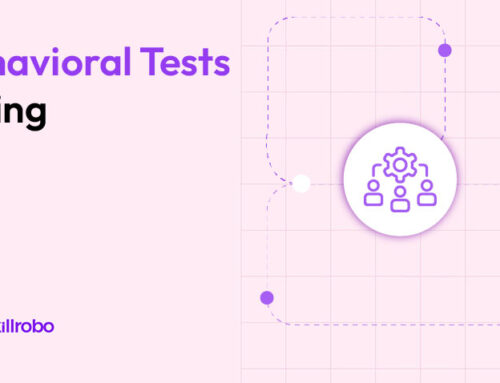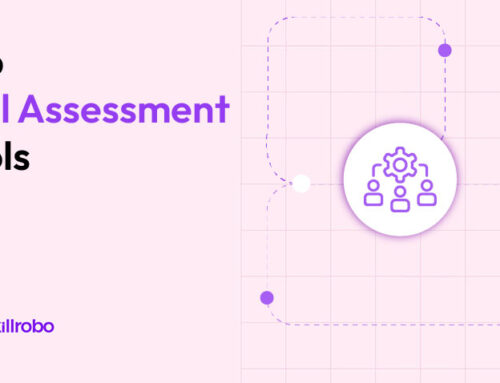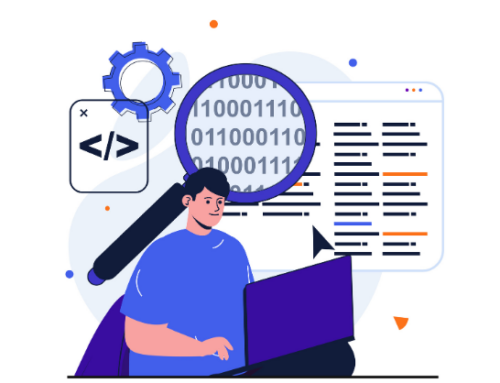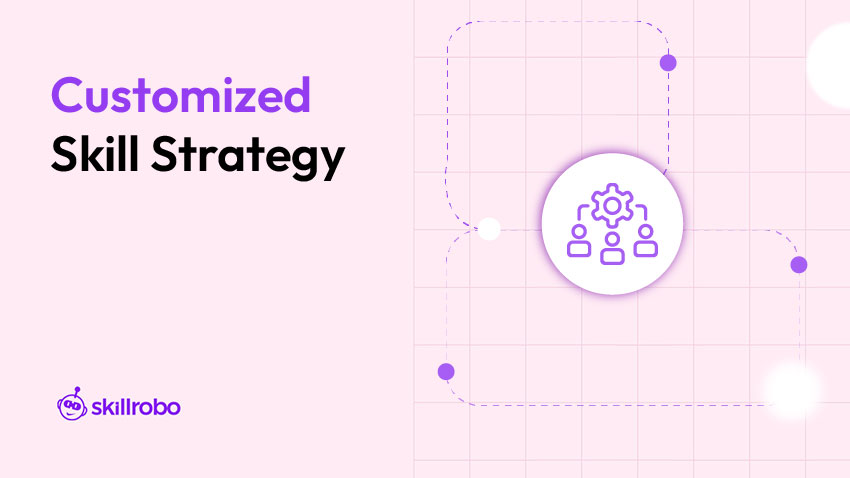
Key Takeaways
- A tailored skills assessment strategy boosts hiring accuracy, workforce performance, and long-term retention.
- Custom assessments aligned to job roles reduce onboarding time and improve productivity from day one.
- Digital tools simplify assessment creation, scoring, and reporting while maintaining candidate experience.
- A data-driven approach helps organizations identify and close workforce skill gaps effectively.
Creating an employee skill assessment strategy isn’t about off-the-shelf solutions—it’s about precision. Whether hiring or training, the right skill assessment framework helps you match talent to tasks, cut hiring errors, and build high-performing teams. The goal? Create a customized assessment flow that reflects your company’s real-world challenges and role expectations. This guide walks through the essential steps, best practices, and digital tools that simplify creating a customized employee skill assessment strategy.
Why Custom Skill Assessments Outperform Generic Tests
Generic skill tests may cover surface-level abilities, but customized assessments mirror on-the-job scenarios. They measure role-specific competencies and practical application, giving recruiters and managers deeper insights into how a candidate or employee will perform in the actual role.
For example, a retail brand might prioritize situational judgment tests over theoretical knowledge. Meanwhile, a logistics firm may test for spatial awareness and error-checking in data entry tasks. This level of relevance makes all the difference in identifying candidates with real potential.
Core Elements of a Skill Assessment Strategy
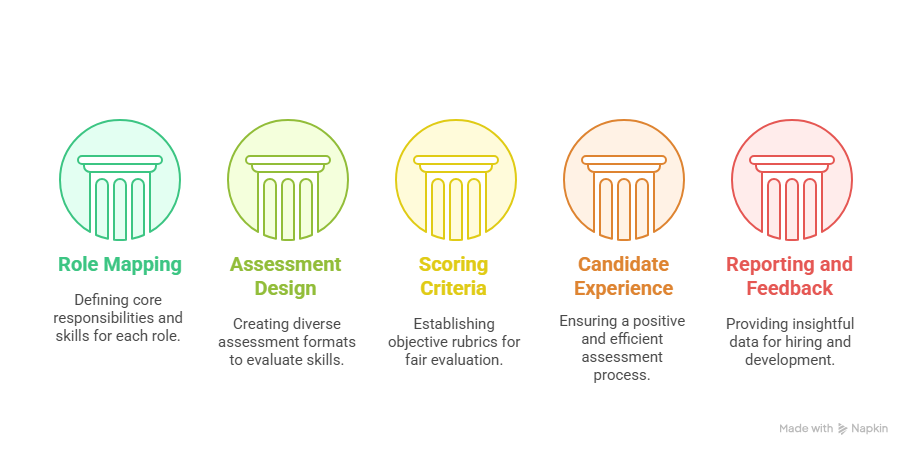
Building a successful employee skill assessment strategy requires more than just test questions. It’s about crafting an experience that’s aligned with the role, easy to evaluate, and insightful enough to guide hiring or development decisions. Below are the five essential components every effective strategy should include:
1. Role Mapping
Understanding what makes a role successful is step one. Role mapping involves outlining the core responsibilities, expected outcomes, and necessary soft and hard skills for each position. This isn’t just about job descriptions—it’s about performance clarity.
For example, hiring administrators can benefit from well-structured administrative skill assessments that test organization, multitasking, and prioritization in realistic work settings. These tailored insights help recruiters target the right candidates from the beginning.
2. Assessment Design
The format of your assessment matters as much as its content. Skill areas vary, so should the way you test them. Use:
- Situational tasks for evaluating decision-making
- Multiple-choice questions for knowledge recall
- Descriptive responses for communication
- Interactive simulations for job-like tasks
If you’re hiring for communication-heavy roles, a communication skills assessment tool such as Skillrobo offers flexible formats to evaluate clarity, tone, and listening comprehension—all critical for roles like customer service and client success.
3. Scoring Criteria
Objective scoring is critical for fairness and consistency. Build clear rubrics that define ideal responses, borderline cases, and red flags. This helps multiple evaluators reach the same conclusions, even in subjective tasks.
When hiring for nuanced roles (e.g., creative or leadership positions), consider integrating psychometric assessments that analyze personality traits, work style preferences, and cognitive strengths. These add a layer of depth to your scoring model beyond right or wrong answers.
4. Candidate Experience
If candidates feel confused, rushed, or frustrated during assessments, you risk drop-offs and poor employer branding. A strong candidate experience means:
- Clear instructions
- Accessible formats
- Mobile compatibility
- Timely completion (ideally under 45 minutes)
Avoid complex or irrelevant questions. Focus on job alignment—especially for high-volume roles such as call centers, where call center assessment tests must be fast, fair, and reflective of daily duties.
5. Reporting and Feedback
The true value of skill assessments lies in the insights they provide. Beyond pass/fail scores, look for tools that offer:
- Skill-wise breakdowns
- Candidate comparison reports
- Visual dashboards
- Training recommendations
Use solutions like employee assessment software to centralize performance data, support hiring decisions, and identify upskilling needs. This feedback loop strengthens both your recruitment and L&D strategies.
Pro Tips for Building Effective Assessments
Designing an assessment isn’t just about asking questions—it’s about measuring potential with precision and fairness. Below are expert-backed strategies to ensure your assessments are insightful, efficient, and aligned with your hiring goals.
1. Collaborate with Team Leads
Involving team leads ensures your assessment reflects real-world job challenges. Their insights help identify critical success traits and practical problem-solving skills specific to the role. For example, if you’re hiring for remote-first roles, consider their input on evaluating independence and time management skills often highlighted in remote hiring strategies.
To further refine these role-specific assessments, explore tools designed to assess soft traits like adaptability and work ethic. The dark triad personality test can help uncover tendencies that impact collaboration and trustworthiness in team settings.
2. Pilot Test Internally
Running the test internally with top performers can highlight confusing instructions or irrelevant questions. It’s a way to calibrate your scoring criteria and set benchmarks. Employees who take the test can offer valuable feedback on content relevance, time taken, and perceived difficulty.
When piloting, consider using a structured format similar to the types of assessment used to organize the hiring process, which ensures alignment with job expectations while revealing possible content gaps.
3. Limit Assessment Length
Overly long tests discourage top talent. The ideal duration is between 30 to 45 minutes. This balances depth with attention span, ensuring candidates remain engaged without feeling burdened.
If you’re testing for detailed tasks—like financial data entry or clerical roles—consider narrowing your scope. Use specialized formats, such as clerical skills assessments, that measure speed, accuracy, and consistency in a short time frame.
4. Prioritize Core Skills
Don’t test everything—focus on what truly matters. Choose 3 to 5 core competencies that directly affect job performance. For instance, communication may be key for client-facing roles, while logic and precision might matter more in data-heavy positions. To align assessments with job impact, refer to frameworks like pre-employment accounting assessments that isolate the technical skills necessary for accuracy, reporting, and compliance.
5. Monitor Completion Behavior
Assessment integrity is just as important as content quality. Use tools that track test-taking behaviors, such as time spent on each question, tab switching, or rapid guessing patterns. These can help flag potential issues like dishonesty or disengagement. Platforms offering online proctored exam types and benefits provide secure test environments while maintaining a smooth experience for serious candidates.
Sample Skill Assessment Structure
Creating a clear structure for your assessments ensures consistency and efficiency in evaluating candidates. Below is a sample layout you can adapt based on role-specific requirements.
| Section | Skill Tested | Format | Weightage |
|---|---|---|---|
| Communication Task | Written Communication | Short-form answer | 25% |
| Scenario Simulation | Problem-Solving | Interactive Task | 30% |
| Tech Knowledge Check | Tool or Platform Proficiency | MCQs | 20% |
| Behavioral Alignment Test | Culture Fit & Adaptability | Situational Q&A | 25% |
When to Use Skill Assessments in the Employee Lifecycle
Skill assessments aren’t limited to the recruitment phase—they offer value throughout an employee’s journey within the organization. When integrated strategically, they help businesses make smarter talent decisions, improve performance, and build future-ready teams.
1. Pre-employment Screening
Skill assessments serve as an objective filter at the very start of the hiring process. Before investing time in interviews, employers can verify whether candidates possess the core competencies required for the role. This not only speeds up shortlisting but also reduces the risk of hiring based on inflated resumes or interview performance alone.
2. Onboarding
Once a new hire joins, assessment results can help customize their onboarding experience. Instead of a generic induction, you can identify areas where the employee might need extra support and adjust the training accordingly. This leads to faster ramp-up times, better early performance, and higher employee confidence in the first 90 days.
3. Upskilling Programs
Employee development is most effective when it’s based on actual need. Skill assessments highlight specific gaps in technical, cognitive, or behavioral areas, allowing learning and development teams to design focused training paths. This targeted approach maximizes ROI from training programs and keeps your workforce adaptive in a changing business environment.
4. Internal Mobility
Before promoting or transferring employees into new roles, assessments can validate whether they are ready to take on expanded responsibilities. This ensures that internal transitions are based on capability, not just tenure or manager recommendations. It also creates a transparent, fair process for career progression, which can boost morale and retention.
Top 10 Tools for Customized Skill Assessment
1. Skillrobo
Skillrobo is a no-code assessment platform that enables businesses to build tailored skill tests with AI-generated questions. Its analytics, proctoring, and public link-sharing features make it a strong choice for remote hiring and SME recruitment.
Key Features:
- AI-powered test creation (SEYARC AI)
- Cheating prevention with webcam and tab-switch tracking
- Instant candidate reports with skill categories
Pros:
- Quick test setup and deployment
- Multiple question types supported
- Cost-effective for small teams
Cons:
- UI could be more modern
- Basic analytics in the free plan
- No mobile testing app
2. Vervoe
Vervoe empowers companies to hire based on merit, not resumes. It offers immersive, role-based assessments that simulate real-world tasks, using AI to automatically grade responses. Its flexible workflows and branding tools make it ideal for businesses looking to personalize the hiring process and improve the prediction of job performance.
Key Features:
- AI auto-grading for written/video responses
- Pre-built assessments for multiple roles
- Custom workflows with employer branding
Pros:
- Strong role simulation capabilities
- Works well for customer support and sales
- Intuitive user interface
Cons:
- Higher pricing for small companies
- Limited advanced reporting options
- Setup may require guidance
3. TestDome
TestDome is a practical assessment platform for filtering candidates across tech and business domains. It supports coding exercises, logic tests, and soft skills evaluation through a straightforward, time-based testing interface. Its no-frills approach allows hiring teams to get accurate results quickly without overcomplicating the assessment experience or setup.
Key Features:
- Skill-specific test templates
- Timed questions with instant scoring
- Coding environments with auto-evaluation
Pros:
- Fast setup
- Focused on both soft and hard skills
- Transparent pricing structure
Cons:
- No AI-based customization
- Limited support for non-tech roles
- Few integration options
4. Lingio
Lingio specializes in upskilling and assessing non-desk employees through gamified, multilingual tests. Ideal for industries like retail, manufacturing, and hospitality, it helps employers assess language proficiency, soft skills, and job readiness. The platform’s intuitive mobile interface supports accessibility for diverse talent pools, including those with limited tech exposure.
Key Features:
- Multilingual skill testing
- Interactive learning content
- Gamified assessments
Pros:
- Excellent for blue-collar hiring
- Supports inclusive recruitment
- Simple and mobile-friendly
Cons:
- Not suited for corporate or tech hiring
- Limited test depth
- Basic reporting
5. Xobin
Xobin is a recruitment platform tailored for startups and high-growth teams. It combines pre-built assessments, webcam-based proctoring, and automated candidate ranking in a user-friendly dashboard. With rapid test creation and scalable workflows, it’s a great fit for teams hiring at volume across both tech and non-tech functions.
Key Features:
- 1000+ ready-made questions
- Proctoring via webcam and mic
- Workflow and report automation
Pros:
- Affordable for startups
- Real-time candidate monitoring
- Easy test customization
Cons:
- UI requires polishing
- Learning curve for non-tech users
- Limited data visualization
6. Codility
Codility is built for technical hiring, offering robust coding tests that assess real-world problem-solving skills. Engineering managers can evaluate candidates using timed tasks, analyze code playback, and compare performance metrics. It’s trusted by global tech companies for reducing hiring time and increasing developer quality through standardized evaluations.
Key Features:
- Role-specific coding tests
- Code playback and analysis
- Candidate leaderboard feature
Pros:
- Great for evaluating developers
- Excellent code challenge library
- Strong anti-cheating setup
Cons:
- Limited to coding roles
- Expensive for small businesses
- Few soft skill test options
7. Sapia.ai (formerly PredictiveHire)
Sapia.ai redefines candidate screening with its chat-based assessments powered by conversational AI. It evaluates communication, empathy, and decision-making traits while providing predictive hiring insights. The mobile-friendly platform enables inclusive screening and reduces bias, making it ideal for assessing cultural fit and behavioral competencies at scale.
Key Features:
- Conversational AI interviews
- Predictive scoring models
- Diversity and inclusion analytics
Pros:
- Unbiased language model-based evaluation
- Mobile-first approach
- High candidate engagement
Cons:
- Not suited for technical role testing
- Limited customization of questions
- May require training for HR teams
8. Glider AI
Glider AI blends assessments, proctoring, and video interviews into one hiring solution. Used widely in IT and consulting, it allows for technical and functional evaluations through real-time code challenges, simulations, and structured interviews. Recruiters can detect skill gaps, validate expertise, and ensure integrity through AI-based monitoring features.
Key Features:
- AI proctoring tools
- Video interview integration
- Code and scenario-based assessments
Pros:
- Suited for technical and business roles
- Strong anti-cheating measures
- Rich analytics
Cons:
- Slightly complex setup process
- Cost may be high for small teams
- No gamified candidate interface
9. HiPeople
HiPeople combines skills assessments with personality and reference checks to create a well-rounded view of candidates. It focuses on cultural alignment and soft skill evaluation, helping companies hire for long-term fit. Its automated insights reduce manual screening effort and support diversity-conscious hiring practices through objective data.
Key Features:
- Pre-employment testing templates
- Cultural fit and value alignment scores
- Reference automation
Pros:
- Combining assessment with candidate insights
- Great for value-based hiring
- Simple dashboard design
Cons:
- Not suited for technical evaluations
- Basic testing library
- Fewer integrations with ATS
10. Vervali Systems (Assessment Engine)
Vervali Systems provides assessment software tailored to IT services, helping companies test both technical knowledge and problem-solving abilities. It features customizable templates, white-labeled portals, and performance analytics. Ideal for staffing firms and internal HR teams, it supports fast deployment and efficient candidate filtering at scale.
Key Features:
- Real-time reporting dashboard
- Coding and scenario testing
- White-labeled test interface
Pros:
- Fast deployment for agencies
- Customizable test templates
- Affordable pricing model
Cons:
- Not widely known
- Limited third-party reviews
- Smaller template base compared to large platforms
Here’s a quick comparison of popular tools that support custom assessments:
| Tool | Best For | Key Features |
|---|---|---|
| Skillrobo | SME hiring, remote assessments | AI question generation, proctoring, and instant reports |
| Vervoe | Tech and customer support roles | AI auto-grading, role-based scenarios, and custom workflows |
| TestDome | Developers and analysts | Timed questions, auto-scoring, coding tasks |
| Lingio | Hospitality, retail, and blue-collar jobs | Multilingual tests, gamification, and onboarding tools |
| Xobin | Startups, volume hiring | 1000+ questions, webcam proctoring, automation |
| Codility | Engineering & tech hiring | Code playback, live coding, skill-based challenges |
| Sapia.ai | Behavioral and cultural fit assessment | Chat-based testing, AI scoring, diversity analytics |
| Glider AI | Tech and functional hiring | AI proctoring, coding & case-based tests, video interviews |
| HiPeople | Culture fit & soft skill hiring | Reference checks, soft skills & value assessments |
| Vervali Systems | IT services, staffing firms | Real-time dashboard, coding tasks, white-labeled setup |
Final Thoughts: Skill Assessment Strategy That Grows With You
An effective skill assessment strategy isn’t static—it evolves with your business. As roles change, so should the competencies you test. By combining structured planning, expert insights, and intuitive platforms like Skillrobo, companies can build smarter, faster, and more equitable hiring processes.
Skillrobo allows you to:
- Build role-specific tests from scratch or use customizable templates
- Leverage SEYARC AI to auto-generate questions
- Prevent cheating with real-time monitoring
- Share tests via public URLs
- Gain instant insights from auto-generated performance reports
Explore how Skillrobo simplifies pre-employment testing by signing up.
Table of content
- Key Takeaways
- Why Custom Skill Assessments Outperform Generic Tests
- Core Elements of a Skill Assessment Strategy
- Pro Tips for Building Effective Assessments
- Sample Skill Assessment Structure
- When to Use Skill Assessments in the Employee Lifecycle
- Top 10 Tools for Customized Skill Assessment
- Final Thoughts: Skill Assessment Strategy That Grows With You




